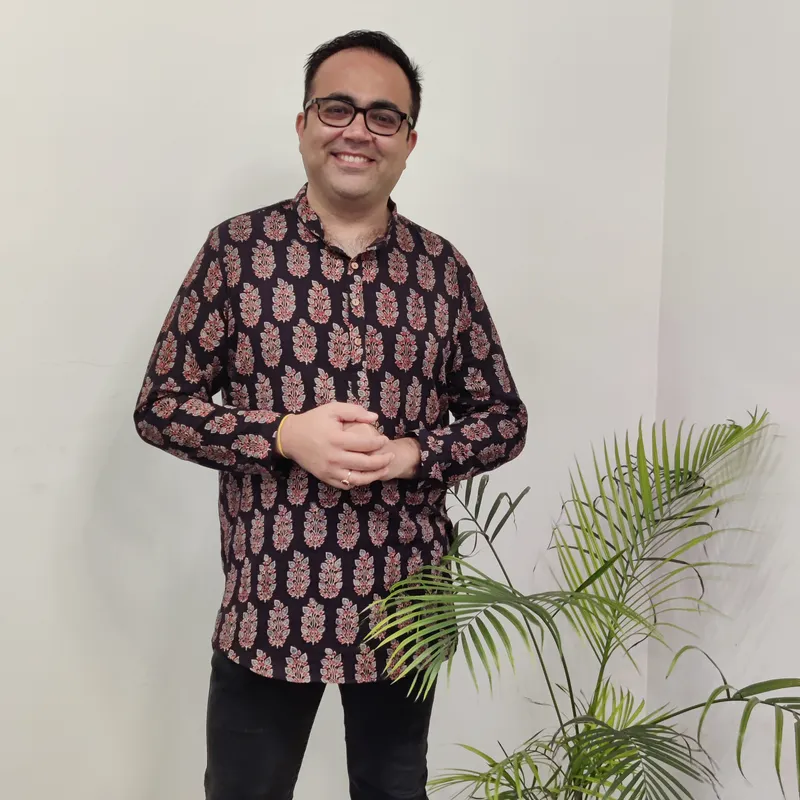[Startup Bharat] How Gwalior-based D2C brand iTokri grew its customer base across India and went global
iTokri was started in 2012 by Nitin and Jia Pamnani. It sells dress material, home decor items, bags, neckpieces, cushion covers, and more through its website and ecommerce platforms.
In March 2020, when the pandemic hit, Nitin and Jia Pamnani, Founders of Gwalior-based D2C startup , were stuck with orders that they had given to several thousand artisans across the country.
“During the first lockdown we were still unsure how things would pan out. But there was one shortage in the country and something that everyone needed — masks. So we started procuring and making our masks, every artisan made masks, and we sold it and that is how we survived the pandemic,” says Nitin, co-founder iTokri.
Building a brand from Tier II India
For Nitin and Jia, challenges weren't new.
The duo had already faced an almost-impossible undertaking when they decided to start D2C brand iTokri. The couple started the business with a focus on young artisans and people in Tier II and III India.
Although D2C is the latest buzzword in the startup ecosystem, direct-to-consumer selling wasn’t popular in 2012, especially in a smaller city such as Gwalior. The founders had to build their own system to sell their products.
“Nobody had heard of ecommerce in Tier II and III India. Everything - from the logistics, supply chain, and infrastructure - had to be set up by us,” Nitin says. With the initial Rs 30 lakh the team had invested, they started a small home office and warehouse facility.
“We started with regular courier partners first for the delivery. We would pack and take the products to the couriers and then get it shipped,” adds Nitin. In 2015, the team partnered with logistics company Blue Dart, which led to further growth.

Why take the D2C route?
“I was in the world of films,” Nitin says. An award-winning documentary filmmaker, he says in 2010 he saw brands and startups grow and evolve in the ecommerce space.
“During those days Flipkart was just starting to create a buzz. And we realised this would be a big thing. We had several acquaintances who were dealing in handicraft and handmade products,” he says.
Nitin’s foresight led to the launch of iTokri. The founding duo used their personal savings to build a platform for artisanal products such as home decor items, printed suit materials, bags, dupattas, neckpieces, cushion covers, and more.
iTokri buys the stock directly from the artisans and then uploads details about the stock on the website. “The products you see on the website are available with us in the warehouse,” he says.
The startup added it has had more than 500,000 visitors this festive season. With the gradually increasing rate of the export in handicraft and handloom industry post COVID-19, iTokri reported a 20 percent growth during the 30-day sales event.
Growing a global brand
iTokri is a global brand, and gets 20 percent of its business from overseas.
The festival season also coincides with the onset of the wedding season — this further increases the number of iTokri’s product dispatch.
This year, more than 30 percent of the orders were from Tier II and III cities in India and 25 percent of shoppers were from the international market, the startup says. Popular categories on the platform include home decor, clothing, sarees and upholstery.
According to iTokri, clothing products saw an increase of 25 percent growth in demand while home décor items saw a 20 percent increase compared to last year.
“As people are moving towards Make in India products and living sustainable lives, the handloom and handicraft industry has seen a gradual positive response from the past few years. We at iTokri have witnessed remarkable responses this year with around 20 percent growth for the 30-day festive season starting from Dussehra till this Diwali. Apart from handlooms, other categories like home decor and accessories also did quite well in this festive season, with recovery close to last year's levels,” Nitin says.
An Avendus report says the country’s D2C business is going to be worth $100 billion in the next five years. India has as many as 600 D2C brands – a number that will significantly grow in the next five years. More than 16 brands have an annual turnover of over $60 million.
The bootstrapped startup has made a revenue of Rs 30 crore this year, and aims to achieve Rs 100 crore revenue in the next three years, riding on the popularity and demand for handicraft and handloom products.
Edited by Affirunisa Kankudti


![[Startup Bharat] How Gwalior-based D2C brand iTokri grew its customer base across India and went global](https://images.yourstory.com/cs/2/a9efa9c02dd911e9adc52d913c55075e/iTokri2-1636525476850.png?mode=crop&crop=faces&ar=2%3A1&format=auto&w=1920&q=75)






